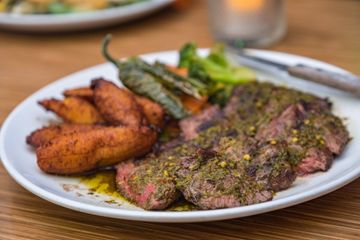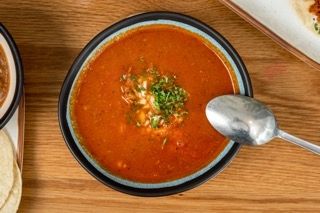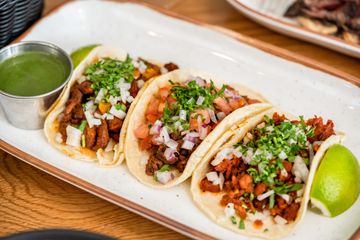End your meal with freshly fried churros covered in caramel sauce
Is Mexican Food Healthy? Unloading the Nutritional Benefits of Standard Active Ingredients
The concern of whether Mexican food is healthy and balanced welcomes an exploration of its standard active ingredients. Beans and corn function as foundational staples, rich in protein and fiber. Avocados supply advantageous fats, while numerous herbs and spices add flavor and wellness advantages - New York Times rated. Together, these elements develop a tapestry of nourishment. However, the healthiness of Mexican cuisine frequently relies on prep work techniques and section sizes. What duty do these elements play in establishing its general nutritional value?
The Power of Beans: Healthy Protein and Fiber-Rich Staples
Frequently neglected, beans offer as a foundation of Mexican cuisine, providing a wide range of dietary benefits. Rich in protein, they are a superb plant-based option for those looking for to meet their nutritional healthy protein requires. This high protein web content sustains muscular tissue fixing and development, making beans invaluable for both meat-eaters and vegetarians alike. Furthermore, beans are an exceptional resource of dietary fiber, which aids in digestion and promotes a feeling of fullness, possibly assisting with weight management.
The variety of beans utilized in Mexican meals, such as black beans, pinto beans, and kidney beans, contributes to a diverse flavor account and can enhance dishes nutritionally. Moreover, beans are low in fat and have vital vitamins and minerals, including magnesium, folate, and iron. With each other, these characteristics make beans an essential component, delivering both nutrients and nutrition in traditional Mexican fare.

Corn: a Versatile Grain With Nutritional Perks
Corn attracts attention as a functional grain fundamental to Mexican cuisine, commemorated not only for its culinary applications however likewise for its remarkable nutritional account. As a key ingredient in dishes like tortillas, tamales, and pozole, corn provides essential nutrients that add to a well balanced diet plan. Rich in carbs, it acts as a substantial power source, while likewise being low in fat, making it a positive option for different dietary needs.
Corn is a great resource of nutritional fiber, which assists in food digestion and promotes satiation. It includes considerable amounts of vitamins such as B-complex vitamins, which are necessary for energy metabolic rate. The existence of anti-oxidants, particularly carotenoids, adds to overall health by lowering oxidative anxiety. Additionally, corn is gluten-free, providing to those with gluten sensitivities. Generally, the dietary advantages of corn highlight its importance in typical Mexican food and its role in a healthy diet plan.
Avocados: Healthy Fats and Nutrients in Every Bite
Avocados play a significant function in Mexican food, complementing dishes with their velvety appearance and rich flavor. Past their cooking appeal, avocados are commemorated for their impressive nutritional account. They are a rich source of healthy monounsaturated fats, which can help reduced poor cholesterol levels and support heart health. In addition, avocados are packed with vital vitamins and minerals, including potassium, vitamin E, and B vitamins, contributing to overall health.
The high fiber content in avocados aids food digestion and promotes satiation, making them a helpful enhancement to any dish. Their one-of-a-kind nutrient make-up can additionally sustain skin health and offer anti-inflammatory advantages. Incorporating avocados into typical Mexican meals or appreciating them as a standalone snack can boost both taste and nourishment, demonstrating why they are a precious staple in Mexican cuisine. In general, avocados supply a delicious method to take pleasure in healthy fats and critical nutrients in every bite.

Herbs and seasonings: Flavorful Wellness Boosters
While taking pleasure in the abundant flavors of Mexican food, one can not forget the vital function that spices and natural herbs play in improving both preference and health and wellness. Ingredients such as cilantro, chili, and oregano peppers not just add to the vibrant taste account however additionally provide significant wellness benefits. Cilantro is understood for its detoxing properties, assisting to remove hefty metals from the body, while oregano is loaded with anti-oxidants and has anti-inflammatory effects.
Chili peppers, a staple in numerous Mexican dishes, contain capsaicin, which has been linked to boosted metabolic rate and pain relief. Additionally, seasonings like cumin and coriander assistance digestion and may aid in blood sugar policy. Integrating these flavorful wellness boosters into dishes not only improves Recommended Reading the culinary experience yet also advertises total well-being, making Mexican cuisine not simply tasty, however additionally nutritionally helpful.
Conventional Food Preparation Techniques: Enhancing Nourishment and Flavor
Conventional cooking approaches in Mexican food play a crucial role in enhancing both nourishment and taste, as they usually focus on time-honored methods and fresh components. Techniques such as nixtamalization, where corn is soaked and cooked in an alkaline option, not only enhance the nutrient profile of tortillas however additionally improve their digestibility - take out and delivery. In addition, using slow-moving cooking approaches, like stewing or braising, permits tastes to fuse magnificently while maintaining the integrity of the components

Often Asked Questions
Are Mexican Food Portions Typically Larger Than Other Foods?
Mexican food sections are typically bigger than those of numerous various other cuisines. This particular mirrors traditional dining practices, stressing public sharing and hearty dishes, which can result in a more considerable offering size on the whole.
How Does the Preparation Approach Affect Healthiness of Mexican Food?
Prep work techniques considerably influence the healthiness of Mexican food. Techniques such as cooking or steaming protect nutrients, while frying can increase unhealthy fat material. Choices of components and cooking designs ultimately identify overall dietary worth.
Can Mexican Food Be Customized for Certain Dietary Limitations?
Mexican food can without a doubt be tailored for particular dietary restrictions. Replacements, such as using corn tortillas for gluten-free diet plans or including more veggies, allow people to delight in traditional tastes while accommodating numerous nutritional needs.
What Prevail Misunderstandings Regarding Mexican Food and Wellness?
Common mistaken beliefs concerning Mexican food consist of the idea that it is top article inherently undesirable, overly zesty, and only click here to read concentrated on fats. In reality, conventional recipes frequently feature healthy active ingredients and can be customized to various dietary needs.
Exist Much Healthier Options at Mexican Dining Establishments?
Healthier choices at Mexican restaurants usually include barbequed meats, beans, and fresh veggies. Selecting dishes that stress entire ingredients and preventing heavy sauces can cause a much more healthy dining experience, promoting general well-being.
The variety of beans made use of in Mexican meals, such as black beans, pinto beans, and kidney beans, contributes to a varied flavor account and can improve meals nutritionally. Avocados play a significant role in Mexican cuisine, enhancing meals with their luscious appearance and rich flavor. Incorporating avocados right into traditional Mexican dishes or enjoying them as a standalone snack can boost both flavor and nutrition, showing why they are a beloved staple in Mexican cuisine. While enjoying the abundant flavors of Mexican food, one can not overlook the vital role that spices and natural herbs play in boosting both preference and health and wellness. Standard food preparation techniques in Mexican cuisine play a vital function in enhancing both nutrition and taste, as they frequently prioritize classic methods and fresh components.